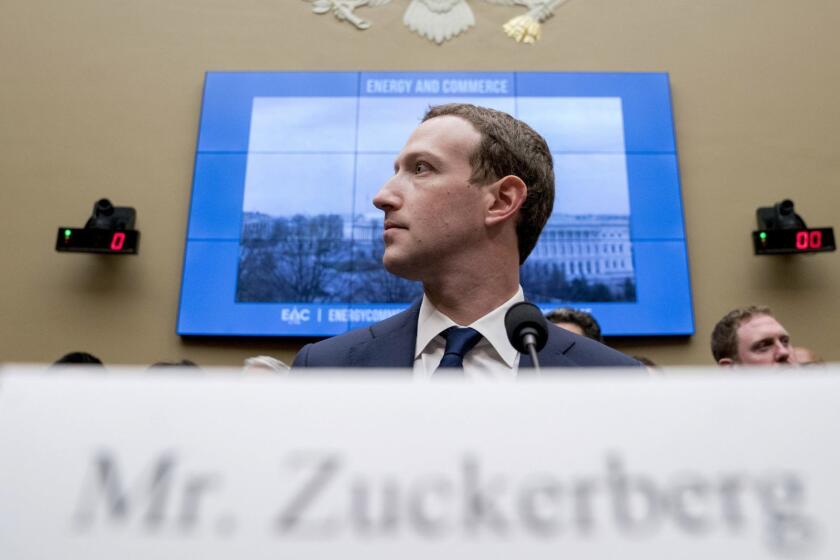Column: Does the WeWork meltdown show we’re in the twilight of the big shot CEO?

Big-talking, omnipotent corporate CEOs have become so much a fixture in the investment world that one might almost think they’ve been with us forever, and still will be until the end of recorded time.
A few recent events, however, suggest that possibly their era has come to an end — or at least is entering a new phase of skepticism. The latest case is that of We Co.’s Adam Neumann, but a few other recent defenestrations support the point. The departing big shots include Travis Kalanick, who stepped down as CEO of Uber in 2017 prior to the ride-hailing company’s initial public offering, and Patrick Byrne of Overstock.com.
There’s also Kevin Burns of Juul Laboratories, one of the promoters of the thesis that Juul’s e-cigarettes are a healthier alternative to tobacco. Burns stepped down Wednesday, yielding his post to a former tobacco executive, as regulatory and legislative initiatives threatening Juul’s very business proliferate.
Neumann’s departure as CEO is the most telling of signs that investors are becoming weary of overpromising and underdelivering CEOs. That’s because he was so intimately identified with We’s claim to be not a mere office space leasing company, but the carrier of a mission to “elevate the world’s consciousness” and he had unassailable control over shareholder votes (even from beyond the grave); and treated the company as a personal piggy bank in a way that was not destined to sit well with public shareholders.
Nothing about WeWork looks normal, and Wall Street may finally be waking up
Neumann was dumped when We’s insider investors realized that his position atop the company was even more of a drag on its forthcoming IPO than its financial performance, which was wretched. The company lost $1.9 billion on revenue of $1.8 billion in 2018, and an additional $904 million on revenue of $1.54 billion in the first half of this year.
Red ink on that scale can be overlooked by retail investors if a company’s boss can credibly make the case that the losses are an investment in growth that will yield spectacular profits over the rainbow. But Neumann’s predilection for sketchy deals with his own company, such as selling We its own trademark and leasing his own buildings to his own company, cost him that credibility.
We wound down or explained away some of these transactions in advance of the IPO, among them an arrangement that allowed him to appoint the people who would control the company after his death (such as his wife). That wasn’t enough to save the original IPO plan, which was for We to go public this month. We’s biggest venture investors, including the giant Japanese SoftBank investment firm, were behind his ouster.
The apparent meltdown at We may also signal a new phase for SoftBank. The firm enthusiastically invested in We at a sky-high valuation of $47 billion, while its CEO, Masayoshi Son, reportedly encouraged Neumann’s rhetorical excesses. The IPO, now scheduled for some point in the future, may value We as low as $10 billion.
The FTC absolves Zuckerberg and Sandberg of responsibility for Facebook’s privacy violations.
Neumann is not exactly gone from We — he will take on the title of non-executive chairman and remains a major shareholder in the company, although he may no longer have a majority of shareholder votes.
Overstock’s Byrne is another CEO who seems to have self-immolated. Byrne’s weird worldview had been on display for years after he acquired the online retailer in 1999. After its stock price collapsed shortly after its 2002 IPO, Byrne blamed a conspiracy by “naked” short sellers. Naked short selling involves sales of nonexistent shares, as opposed to sales of borrowed shares. The Securities and Exchange Commission doesn’t believe it’s a big factor in the market, and there’s been no evidence that it contributed to Overstock’s fall.
More recently, Byrne got Overstock involved in blockchain technologies, which are generically related to the technology underlying cryptocurrencies such as bitcoin. But his ultimate downfall seems related to his claim to have been enticed by shadowy government “Men in Black” into participating in “political espionage conducted against Hillary Clinton and Donald Trump (and to a lesser degree, Marco Rubio and Ted Cruz).”
He said, among other things, that the espionage campaign involved his romantic relationship with Maria Butina, an accused Russian agent currently serving a term in federal prison.
Whole Foods throws hundreds of part-timers off its health plan, as Jeff Bezos reneges on his pledge to dump shareholder value managing.
These claims sent Overstock shares down sharply and prompted the company’s director and officer liability insurer to threaten to withdraw its coverage, Byrne told the Washington Post. The threat forced him to step down. He sold all his Overstock shares and said he would invest the proceeds in cryptocurrencies and precious metals.
It may be too early to say that these departures herald a change in attitude among venture investors and public markets toward deeply entrenched CEOs, especially those with money-losing business plans supported by promises of profits in the remote future.
There are no signs, for example, that the position of Facebook’s founder and CEO Mark Zuckerberg is compromised, despite a series of breaches of user privacy and proliferating questions about the company’s role in spreading political disinformation. Zuckerberg’s holdings of supermajority shares make him almost impossible to dislodge, and in any case, Facebook remains spectacularly profitable. And Tesla CEO Elon Musk still retains a cadre of loyal followers in the investment community, even as his electric car company consistently falls short of profitability and despite his freewheeling style having attracted regulatory enforcement by the SEC.
Moreover, fundamental changes in corporate practice tend to unfold at an adagio pace. Companies are still going public with the same over-hyped mission statements by securely embedded managements. Exhibit of the day: Peloton, which describes itself as a “technology media software product experience fitness design retail apparel logistics company” — a baroque way of saying it sells exercise bikes, treadmills and fitness classes.
Peloton launched its initial public offering Thursday and closed down more than 11% from its IPO price. Its founders, management team and other insiders, including founder and CEO John Foley, continue to hold 99.1% of the company’s voting power, thanks to shares carrying 20 votes each that aren’t available to the public. Peloton lost $246 million on revenue of $719 million in its fiscal year ended June 30.
Keep an eye on Peloton. It’s presenting itself as a world-changing company, it’s got an entrenched management, and it’s a money-loser. With We’s struggle in mind, Peloton CEO Foley may want to keep his severance package up to date.









